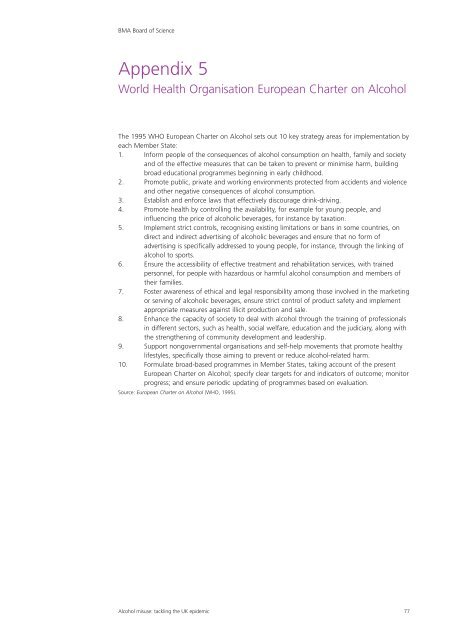Alcohol misuse: tackling the UK epidemic - London
Alcohol misuse: tackling the UK epidemic - London
Alcohol misuse: tackling the UK epidemic - London
Create successful ePaper yourself
Turn your PDF publications into a flip-book with our unique Google optimized e-Paper software.
BMA Board of Science<br />
Appendix 5<br />
World Health Organisation European Charter on <strong>Alcohol</strong><br />
The 1995 WHO European Charter on <strong>Alcohol</strong> sets out 10 key strategy areas for implementation by<br />
each Member State:<br />
1. Inform people of <strong>the</strong> consequences of alcohol consumption on health, family and society<br />
and of <strong>the</strong> effective measures that can be taken to prevent or minimise harm, building<br />
broad educational programmes beginning in early childhood.<br />
2. Promote public, private and working environments protected from accidents and violence<br />
and o<strong>the</strong>r negative consequences of alcohol consumption.<br />
3. Establish and enforce laws that effectively discourage drink-driving.<br />
4. Promote health by controlling <strong>the</strong> availability, for example for young people, and<br />
influencing <strong>the</strong> price of alcoholic beverages, for instance by taxation.<br />
5. Implement strict controls, recognising existing limitations or bans in some countries, on<br />
direct and indirect advertising of alcoholic beverages and ensure that no form of<br />
advertising is specifically addressed to young people, for instance, through <strong>the</strong> linking of<br />
alcohol to sports.<br />
6. Ensure <strong>the</strong> accessibility of effective treatment and rehabilitation services, with trained<br />
personnel, for people with hazardous or harmful alcohol consumption and members of<br />
<strong>the</strong>ir families.<br />
7. Foster awareness of ethical and legal responsibility among those involved in <strong>the</strong> marketing<br />
or serving of alcoholic beverages, ensure strict control of product safety and implement<br />
appropriate measures against illicit production and sale.<br />
8. Enhance <strong>the</strong> capacity of society to deal with alcohol through <strong>the</strong> training of professionals<br />
in different sectors, such as health, social welfare, education and <strong>the</strong> judiciary, along with<br />
<strong>the</strong> streng<strong>the</strong>ning of community development and leadership.<br />
9. Support nongovernmental organisations and self-help movements that promote healthy<br />
lifestyles, specifically those aiming to prevent or reduce alcohol-related harm.<br />
10. Formulate broad-based programmes in Member States, taking account of <strong>the</strong> present<br />
European Charter on <strong>Alcohol</strong>; specify clear targets for and indicators of outcome; monitor<br />
progress; and ensure periodic updating of programmes based on evaluation.<br />
Source: European Charter on <strong>Alcohol</strong> (WHO, 1995).<br />
<strong>Alcohol</strong> <strong>misuse</strong>: <strong>tackling</strong> <strong>the</strong> <strong>UK</strong> <strong>epidemic</strong> 77
















